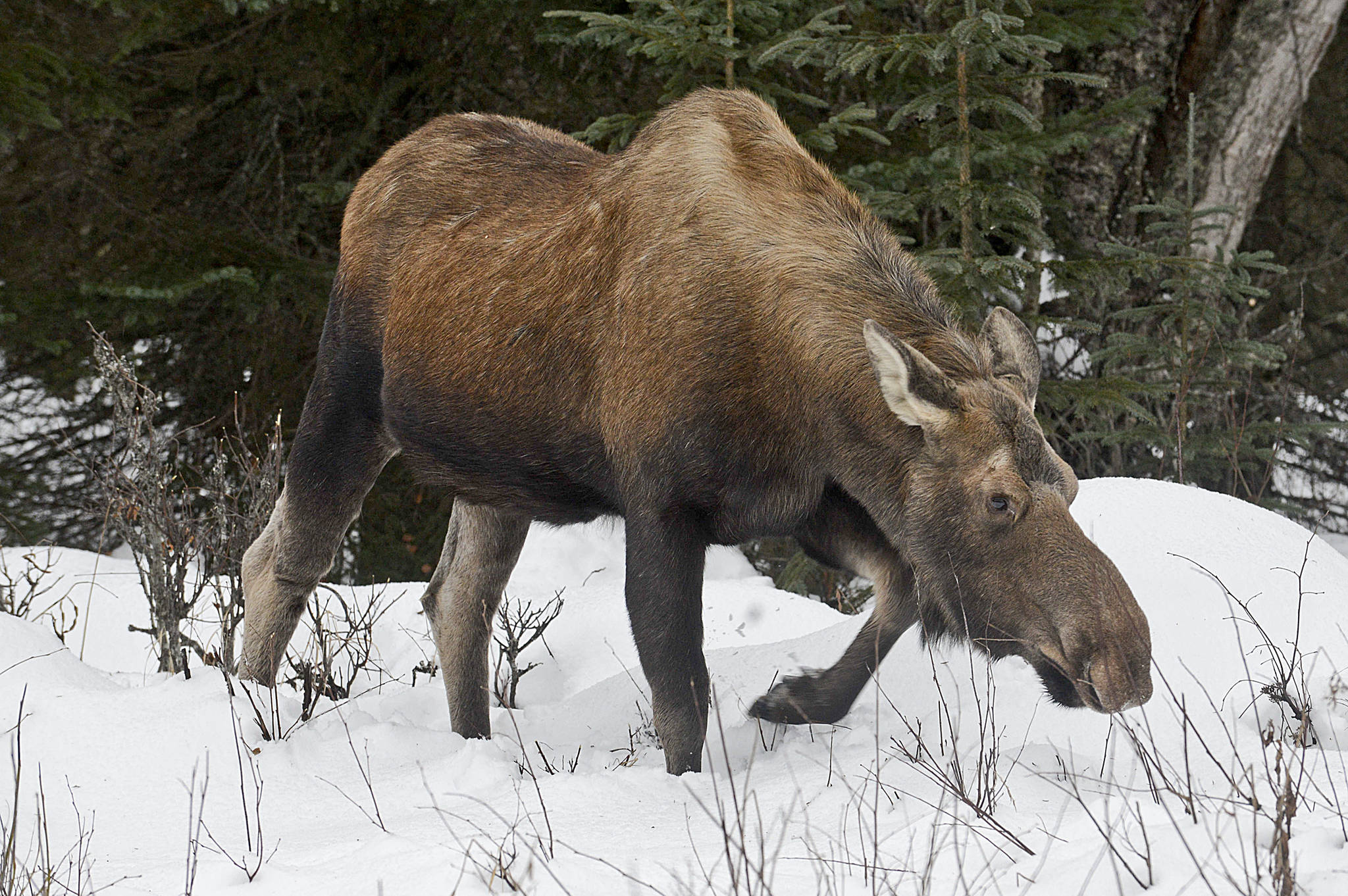Alaska’s moose are big, beautiful and currently quite cranky — and biologists are warning people to be extra careful around them for the time being.
As winter wears on, moose get tired and irritable as they wade through deep snow searching for the nutrient-poor food sources still available to them, said Jeff Selinger, area wildlife biologist at the Alaska Department of Fish and Game’s Soldotna office.
“They’ll tend to get more aggressive as food items get sparser,” he said.
In recent years when Alaska experienced very mild winters, moose had more food options closer to the ground that were exposed for them, Selinger said. During a winter like this one, the animals spend months in a nutrition deficit, he said, working harder and eating things like nutrient-poor twigs in bulk to get through.
This deficit, which lasts until green vegetation is exposed again in the spring, makes moose grumpy and more likely to be aggressive during encounters with humans or pets.
“They do tend to get shorter fuses this time of year,” said Fish and Game Public Information Officer Ken Marsh. “… They’re tired, they’re irritable, probably like most other Alaskans in some ways.”
Fish and Game has gotten several reports of moose attacks or aggressive encounters from areas including Anchorage, Palmer and Homer in recent weeks, according to a Tuesday release from the department.
Staff at Alyeska Resort in Girdwood shot and killed a moose Sunday after it was seen charging a group of people near an upper-mountain ski lift, the Alaska Dispatch News reported. Members of the resort first contacted the Alaska Wildlife Troopers, but Marsh said authorities aren’t always notified of aggressive moose encounters, or that Fish and Game staff hear about them secondhand from Wildlife Troopers.
“A lot of them go unreported and end up on social media, too,” Marsh said.
It’s important to get in touch with Fish and Game or Wildlife Troopers if people notice an aggressive or problematic moose in the neighborhood, he said, rather than taking matters into one’s own hands. Authorities can often help people avoid negative encounters altogether, and therefore avoid having to put a moose down unnecessarily, he said.
Not all moose are extra aggressive this time of year — it’s just more likely.
“One of the biggest points I need to make is (that) every moose out there isn’t a mean moose or an aggressive moose,” Selinger.
The moose habitat in Game Management Unit 15A, for example, is poor compared to a more decent habitat in unit 15C, he said. The moose in 15A are therefore more nutritionally stressed than those in 15C, Selinger said, and potentially more likely to show signs of aggression, though every moose is different.
Feeding hungry moose, which is illegal, might seem like a logical solution, but Marsh and Selinger said that actually contributes to the problem. When moose become accustomed to getting food from certain people in the neighborhood and that food source goes away or the moose moves on to a new area, it can take out its frustration on surrounding people or pet dogs, they said.
Loose or poorly-contained garbage can create similar issues.
“They’ll defend dumpsters,” Selinger said.
Ingesting things like plastic from neighborhood garbage can also be fatal for the animals, he said. While most people think bears are the biggest things to be concerned about when it comes to their trash, Selinger said it’s important to secure it even when bears aren’t around.
The tips for avoiding aggressive moose this time of year are much the same as during any other time. Those who come upon the animals while out walking or in the neighborhood should try to get around them while giving them as much space as possible, or turn around and go back the way they came.
“This time of year, considering the fact that they’re a little bit more cranky … they’re going to be a little less likely to give up the trail right now,” Marsh said. “… They’re going to want to stay on that nice packed trail.”
Keeping dogs secured inside their yards and leashed when out and about is also a good idea, Selinger said. Dogs barking at moose can stress them more, and they might take that stress out on the next dog or person they come across, he said.
While it’s never a good idea to get to close to a moose, Marsh said this time of year requires more caution than usual.
“Don’t push it … definitely give them more space than you normally would,” he said.
Reach Megan Pacer at megan.pacer@peninsulaclarion.com.

